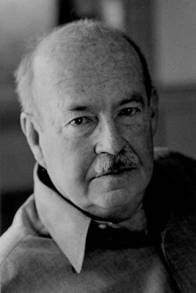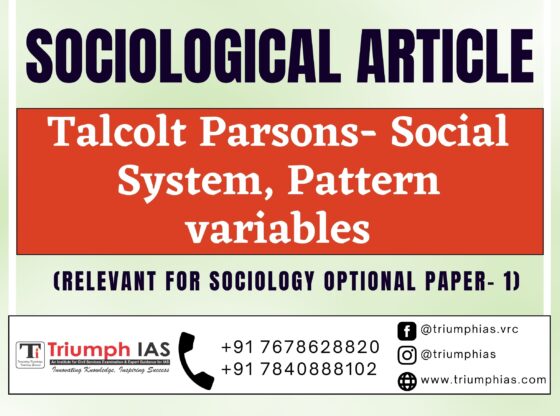Talcolt Parsons- Social System, Pattern variables
Relevant for sociology optional Paper- 1 (Unit- 4 : Sociology- Sociological Thinkers)

Talcott Parsons (1902-1979) was an American sociologist who is widely regarded as one of the most important figures in the development of modern sociology. His work on social systems and pattern variables has had a lasting impact on the field of sociology and related disciplines.
Parsons’ early work focused on the structure and functioning of social systems. He believed that social systems were made up of a complex set of interdependent parts, including social institutions, norms, values, and roles. According to Parsons, these parts work together to maintain social equilibrium and ensure the stability of the system.
One of Parsons’ key contributions to sociology was his concept of pattern variables. Pattern variables are a set of opposing values that guide social action and decision-making. These values include universalism vs. particularism, affectivity vs. neutrality, specificity vs. diffuseness, and achievement vs. ascription. Parsons argued that these values were fundamental to the functioning of social systems and could be used to analyse social phenomena.
Parsons’ concept of pattern variables was closely linked to his theory of action. He believed that individuals were guided by a set of values and norms that shaped their behaviour and decision-making. According to Parsons, social action was a complex process that involved a number of different factors, including the individual’s values, the social context in which the action was taking place, and the individual’s understanding of the situation.
Another important aspect of Parsons’ work was his analysis of social institutions. He believed that social institutions, such as the family, religion, and education, were essential for the functioning of society. According to Parsons, social institutions provide individuals with a sense of purpose and belonging, and help to maintain social stability and order.
Parsons’ work has been influential in the development of structural-functionalism, a theoretical approach to sociology that emphasizes the importance of social structure and social institutions in maintaining social order. However, his ideas have also been criticized for neglecting the role of power and conflict in society, and for failing to take into account the experiences of marginalized groups.
Despite these criticisms, Parsons’ ideas continue to be studied and debated in sociology and related disciplines. His emphasis on the importance of social institutions and values in shaping social behaviour and decision-making has informed much of the sociological research that followed him. Furthermore, his concept of pattern variables has been used to analyse a wide range of social phenomena, from political decision-making to organizational behaviour. Overall, Talcott Parsons’ work has had a lasting impact on the development of sociology as a discipline, and continues to be relevant and influential today.
For more such notes, Articles, News & Views Join our Telegram Channel. https://t.me/triumphias
Click the link below to see the details about the UPSC –Civils courses offered by Triumph IAS. https://triumphias.com/pages-all-courses.php


